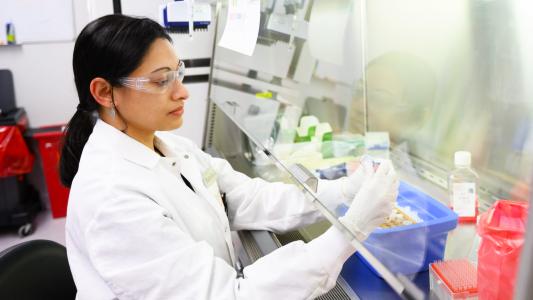British pharma colossus GlaxoSmithKline (GSK) recently announced a successful experiment that they believe will revolutionize vaccine manufacturing — and potentially the whole industry.
The model, called a “digital twin,” is a virtual replica of their entire vaccine development process. The system plugs into data from their real-world factories, where “the physical sensors send data to the twin and the simulated insights are fed back to the control system to keep the process at the optimum,” according to GSK.
The twin allows the company to tweak, innovate, and simulate the entire process, unlocking hidden gains and fixing problems before they happen.
Digital twin manufacturing: Digital twins (no, not the living-forever kind) are replicas of products, processes, services, and even entire businesses that are used as in silica test subjects.
According to the American Society of Mechanical Engineers (ASME), digital twins are created using sensors and data from the real thing; from there, a real-time model of both the shape and operation of whatever you’re making a twin of is created.
“More than a blueprint or schematic, a digital twin combines a real-time simulation of system dynamics with a set of executive controls,” tech consultant Daniel Araya told ASME.
Once a digital twin has been created, it can be used to better understand and optimize a product or system, or show you more cost-effective ways to design and develop new ones.
BMW announced it will be developing digital twins to aid in the R&D phase of new cars.
“A digital twin can integrate data from previous model designs with the new concept in their digital formats,” Control Automation explained. “During product testing, there is no need to wait for performance data collected during vehicle trials to define its performance and quality.”
And, importantly for GSK, they can be used to analyze production processes and capabilities.
“Make it right the first time”: GSK partnered with Siemens and Atos to create a digital twin of their factory process for creating a vaccine adjuvant, a molecule that helps spark a robust immune response.
“This digital ‘factory’ allows us to simulate, monitor closely, anticipate failures, and optimise quality and self-learning,” GSK said. “The performance data obtained from real run is fed back into the development process and helps optimise products and processes at an early stage.”
That performance data is then analyzed with a number of models and machine learning techniques, Matt Harrison, digital innovation lead for vaccines at GSK, told Fierce Pharma.
According to Harrison, the digital twin may be most useful in teasing out variabilities in the manufacturing process.
“If you can understand the causes of that variability, you have the potential to make it right the first time,” Harrison said. Modeling inconsistencies in the manufacturing process may help minimize risk and help facilities transfer capabilities, as well.
GSK plans to gradually implement digital twins into more and more processes, and eventually incorporate them into vaccine R&D, as well, where reduced need for real experimentation may make the process quicker, more cost effective, and sustainable.
We’d love to hear from you! If you have a comment about this article or if you have a tip for a future Freethink story, please email us at tips@freethink.com.
